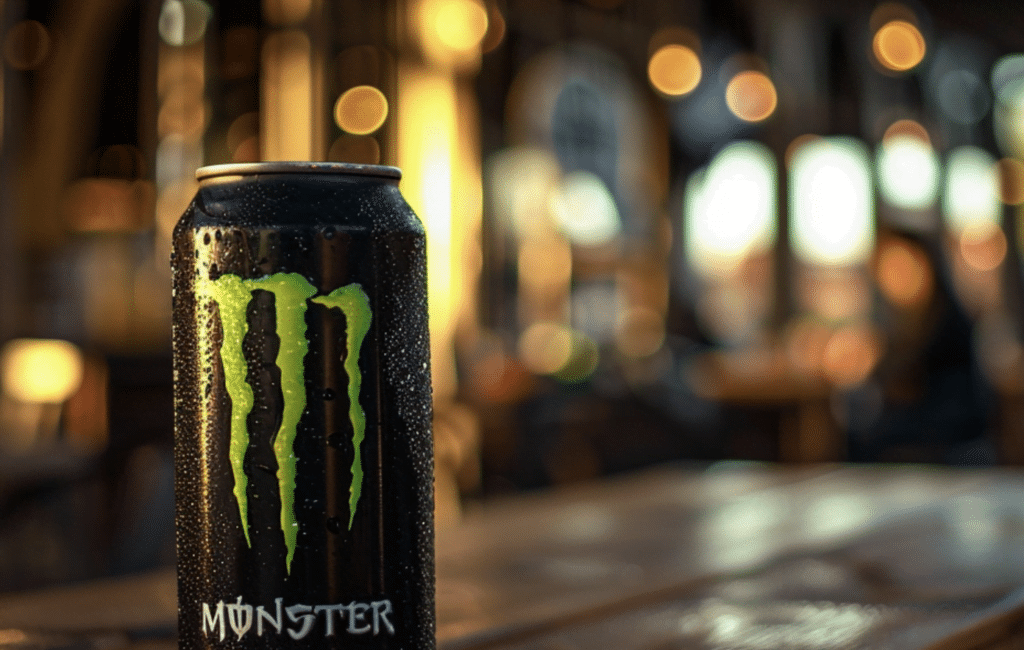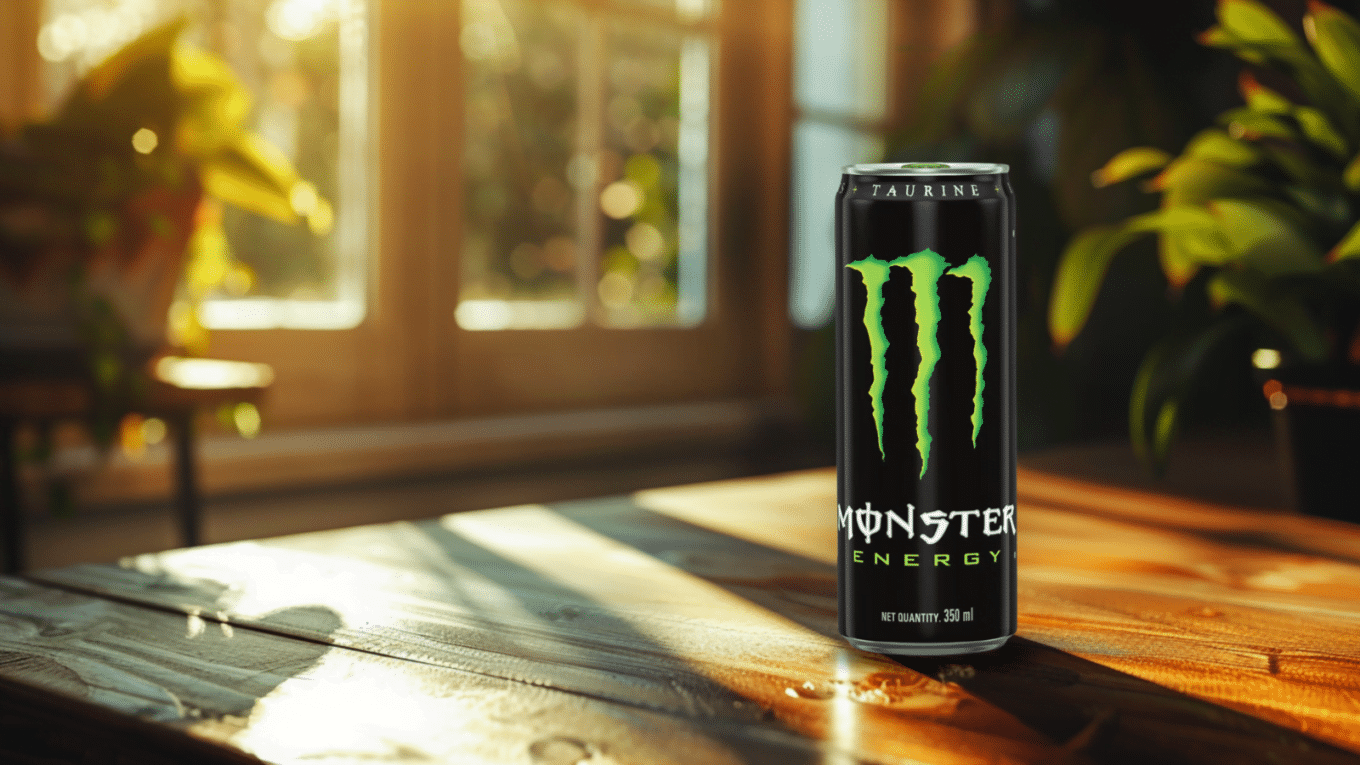Many people rely on energy drinks like Monster to boost their energy and focus.
While these beverages may provide a temporary lift, regular consumption can lead to serious health issues.
In this article, we’ll expose the hidden dangers of drinking Monster Energy regularly, helping you make informed decisions about your health and well-being.
We’ll examine the side effects of excessive caffeine and sugar, the dangers of mixing energy drinks with alcohol, and the long-term impacts of daily consumption.
By the end, you’ll understand why moderation is key in energy drinks and how to find healthier alternatives to fuel your day.
The Hidden Dangers of Monster Energy Drinks

1. Cardiovascular Health Risks
Regular consumption of energy drinks like Monster can negatively impact cardiovascular health.
The common ingredients in these beverages, such as high levels of caffeine and sugar, are linked to increased risks of heart disease and other cardiovascular issues.
Blood Pressure Increase
A study on Monster Energy drinks showed that participants had higher systolic and diastolic blood pressure. It also causes increased heart rate and reduced cerebral blood flow after consumption.
Long-Term Implications
Persistent high blood pressure can cause atherosclerosis, where arteries harden and narrow, raising heart attack and stroke risk.
Regular energy drink consumption can contribute to these serious health issues.
Risk of Heart Disease
Drinking energy drinks like Monster regularly can maintain elevated blood pressure and heart rate over an extended period.
Research has found that this prolonged stress on the cardiovascular system can have severe consequences.
Potential for Irregular Heartbeat and Cardiovascular Disease
High doses of caffeine and taurine in Monster Energy drinks can cause heart arrhythmias and other cardiovascular issues.
Case studies have reported instances where excessive consumption resulted in serious heart-related incidents.
Useful Tips
- Monitoring and Moderation: To reduce the risks of energy drinks, monitor how your body reacts to them. Limit your intake based on medical recommendations and be aware of any unusual symptoms.
- Healthier Alternatives: Instead of energy drinks, try natural alternatives like green tea, which has caffeine and antioxidants. Staying hydrated, eating a balanced diet, and regular exercise can also boost energy and improve heart health.
2. Caffeine Overdose
Caffeine in Monster Energy drinks boosts energy and alertness, but too much can cause serious health risks, including caffeine overdose.
Safe Limits vs. Excessive Consumption
The FDA recommends a safe daily caffeine intake of up to 400 mg for adults. However, a single can of Monster Energy contains 160 mg of caffeine, making it easy to exceed safe limits with regular consumption.
Symptoms of Overdose
- Tension and Anxiety: High caffeine intake can worsen stress and anxiety levels, leading to feelings of nervousness and restlessness.
- Nausea and Tremors: Caffeine overdose can cause physical symptoms like nausea, vomiting, and muscle tremors.
Case Studies: One study found that a 28-year-old man experienced cardiac arrest after consuming three cans of energy drinks before a basketball game.
Caffeine Content Comparison
| Beverage/Recommended Limit | Caffeine Content (mg) per Serving | Serving Size |
|---|---|---|
| Monster Energy Drink (Original) | 160 mg | 16 fl oz (473 ml) |
| Red Bull | 80 mg | 8.4 fl oz (250 ml) |
| Coffee (Brewed) | 95 mg | 8 fl oz (240 ml) |
| Espresso | 63 mg | 1 fl oz (30 ml) |
| Cola (e.g., Coca-Cola) | 34 mg | 12 fl oz (355 ml) |
| Tea (Black) | 47 mg | 8 fl oz (240 ml) |
| Green Tea | 28 mg | 8 fl oz (240 ml) |
| Chocolate Milk | 5 mg | 8 fl oz (240 ml) |
| Energy Shot (5-Hour Energy) | 200 mg | 1.93 fl oz (57 ml) |
| FDA Recommended Limit (Adults) | 400 mg | Per day |
| American Academy of Pediatrics (Children 12-18) | 100 mg | Per day |
| Recommended Limit (Children <12) | Avoid Caffeine | – |
Dependence and Withdrawal
Dependency Issues
- Daily Requirement: Regular consumption of Monster Energy drinks can lead to caffeine dependence, where the body requires increasing amounts of caffeine to achieve the desired effect.
- Reduced Effect Over Time: As tolerance builds, chronic users may find that their usual dose of caffeine becomes less effective, prompting them to consume more.
Withdrawal Symptoms
- Headaches: Sudden cessation of caffeine intake can cause withdrawal headaches, a common symptom among regular caffeine consumers.
- Reduced Cognitive Function: Withdrawal from caffeine can lead to mental fog, difficulty concentrating, and decreased alertness.
- Additional Symptoms: Other withdrawal symptoms may include irritability, fatigue, and depressed mood.
Useful Tips
- Moderation and Monitoring: To avoid caffeine overdose, it’s crucial to moderate your intake of Monster Energy drinks. Limit your consumption to one can per day at most, and be mindful of other sources of caffeine in your diet, such as coffee or tea. Pay attention to your body’s response to caffeine and adjust your intake accordingly.
- Managing Dependence: If you depend on caffeine, reduce your intake gradually rather than quitting abruptly. This can help minimize withdrawal symptoms. Consider alternatives to caffeine for boosting energy, such as staying hydrated, taking short breaks, and engaging in regular physical activity.
3. Metabolic and Renal Issues
Regular consumption of energy drinks like Monster can lead to serious metabolic and renal health risks. The beverages’ high sugar and caffeine content are the primary contributors to these issues.
Weight Gain
- Sugar Content and Calorie Intake Leading to Obesity: A single 16-ounce can of Monster Energy contains 54 grams of sugar and 210 calories. Regular consumption of these high-sugar, high-calorie drinks can significantly contribute to weight gain and obesity. Studies have shown a strong link between sugary beverage consumption and increased rates of obesity.
- Compensatory Eating Behaviors from Calorie-Free Drinks: Even consuming calorie-free or low-calorie energy drinks can lead to compensatory eating behaviors. People may feel justified in consuming more calories from other sources after having a “zero-calorie” drink. This psychological effect can result in an overall increase in calorie intake, leading to weight gain.
Kidney Damage
- Caffeine as a Diuretic Leading to Dehydration: Caffeine acts as a diuretic, increasing urine production and potentially causing dehydration. A 16-ounce can of Monster Energy contains 160 mg of caffeine. Its regular consumption can put individuals at risk of dehydration. Dehydration can cause various health issues, including fatigue, dizziness, and headaches.
- Long-Term Renal Impact: Chronic dehydration from excessive caffeine intake can long-term impact kidney function. It can increase the risk of developing kidney stones and chronic kidney disease. Studies have shown that high caffeine intake and chronic dehydration are linked to a greater likelihood of long-term renal damage.
Useful Tips
- Moderation and Hydration: To minimize the metabolic and renal risks associated with Monster Energy drinks, it’s crucial to practice moderation. Limit your consumption to occasional use, and avoid drinking multiple cans per day. Additionally, stay hydrated by drinking plenty of water throughout the day, especially when consuming caffeinated beverages.
- Healthy Alternatives: Instead of relying on energy drinks, consider more nutritious alternatives such as natural fruit juices, herbal teas, or water infused with electrolytes. A balanced diet rich in fruits, vegetables, lean proteins, and whole grains can support overall metabolic and renal health.
4. Dental and Digestive Problems
Regular consumption of Monster Energy drinks can lead to significant dental and digestive health risks.
The beverages’ high citric acid and sugar content are the primary contributors to these issues.
Tooth Decay
- High Citric Acid Content Eroding Enamel: Monster Energy drinks are high in citric acid, which can erode tooth enamel and increase tooth sensitivity and decay risk. The sugar in these drinks feeds harmful bacteria, worsening tooth decay.
- Long-term Dental Health Impact: Regular energy drink consumption can severely impact long-term dental health. Continued exposure to citric acid and sugar increases the chances of developing cavities, gum disease, and tooth loss. Dental experts and studies have consistently linked high citric acid and sugar intake to poor dental health outcomes.
Digestive Upset
- Overconsumption Causing Stomach Issues: Drinking too many Monster Energy drinks can lead to various digestive problems. The high caffeine content and other stimulants in these beverages can increase stomach acid production, leading to acid reflux, gastritis, and general stomach discomfort.
- Case Studies/Examples: Research has shown that excessive energy drink consumption can cause digestive issues. In one case study, a woman who consumed up to six energy drinks per day experienced significant gastrointestinal distress, including stomach pain and vomiting.
Useful Tips
- Dental Health Maintenance: To protect your dental health from Monster Energy drinks, use a straw to minimize contact with your teeth. Rinse your mouth with water after drinking, and have regular dental check-ups. Limit sugary and acidic drinks, and choose healthier options like water or milk.
- Managing Digestive Health: To prevent digestive issues, limit Monster Energy drinks and avoid drinking them on an empty stomach. Eat balanced meals to buffer the effects of acid and caffeine. Choose nutrient-rich whole foods that are gentler on your digestive system for an energy boost.
5. Sleep and Mental Health
Regular consumption of Monster Energy drinks can significantly impact sleep patterns and mental health. The high caffeine content in these beverages is the primary contributor to these effects.
Insomnia and Sleep Disruption
- Adenosine Receptor Blocking by Caffeine: Caffeine blocks adenosine receptors in the brain, which help with sleep and relaxation. Drinking Monster Energy drinks, especially late in the day, can delay sleep and reduce overall sleep time. Studies show that caffeine disrupts the sleep-wake cycle.
- Reduced Sleep Quality and Daytime Dysfunction: Regular consumption of energy drinks can lead to poor sleep quality, with lighter and fragmented sleep. This disruption causes daytime dysfunction, decreased cognitive performance, and increased fatigue. Those who rely on energy drinks may enter a cycle of poor sleep and daytime sluggishness.
Headaches and Mental Strain
Migraine Triggers and Withdrawal Symptoms: High caffeine intake from Monster Energy drinks can trigger migraines and tension headaches. Stopping caffeine suddenly can cause withdrawal symptoms like headaches, irritability, and mood disturbances. Medical experts recognize these links.
Mental Strain and Anxiety: The caffeine in Monster Energy drinks can worsen anxiety and stress. Regular high caffeine consumption may lead to chronic stress and anxiety disorders. Research links excessive energy drink consumption to increased mental health issues.
Useful Tips
- Improving Sleep Hygiene: To improve sleep, maintain a regular sleep schedule and a restful environment. Avoid Monster Energy drinks several hours before bed to reduce caffeine’s impact. Instead, boost energy with regular exercise and a balanced diet.
- Managing Caffeine Intake: Gradually reduce Monster Energy drinks to avoid withdrawal and improve sleep and mental health. Choose healthier alternatives like herbal teas or flavored water for a refreshing boost without the negative effects of too much caffeine.
6. Risks to Specific Populations
Monster Energy drinks pose unique risks to children, teenagers, and those who mix them with alcohol.
These groups are more vulnerable to the harmful effects of high caffeine and mixing energy drinks with other substances.
Children and Teenagers
- Recommended Limits for Young People: Health authorities advise that children and teenagers consume much less caffeine than adults. The limit for adolescents is 100 mg per day. A 16-ounce can of Monster Energy contains 160 mg of caffeine, exceeding this limit. High caffeine intake can negatively affect young people’s developing bodies and brains.
- Case Study of Severe Effects on a Teenager: A 14-year-old boy suffered a cardiac arrest after drinking multiple cans of Monster Energy in 24 hours. He had a pre-existing heart condition and required intensive medical care. This case highlights the dangers of excessive energy drink consumption, especially for vulnerable individuals.
Combination with Alcohol
- Misconceptions and Increased Risk Behaviors: Mixing energy drinks with alcohol can create a false sense of sobriety, leading to increased risk-taking behaviors. Caffeine can mask alcohol’s effects, making individuals unaware of their true level of intoxication. Studies show that people who mix these drinks are more likely to engage in risky actions.
- Studies Linking Energy Drink-Alcohol Mix to Aggression and Risky Actions: Research links mixing energy drinks with alcohol to aggressive behavior. High caffeine and alcohol intake can heighten aggression and impair judgment. Case studies show instances of violent or reckless behavior after consuming these mixed drinks.
Useful Tips
- Guidance for Parents and Guardians: Parents should monitor their children’s Monster Energy drink consumption. Educating them on the risks of excessive caffeine and mixing energy drinks with alcohol is essential. Open conversations and providing resources can help young people make informed health decisions.
- Safe Consumption Practices: Moderation is key for those who drink Monster Energy. Know your limits and avoid mixing with alcohol. Suppose you drink alcohol, alternate with water, and don’t use energy drinks to mask intoxication. Listen to your body and seek medical help if needed.
- Alternative Choices: Young people can choose healthier options like natural fruit juices or smoothies for energy instead of energy drinks. Making responsible choices and prioritizing safety when it comes to alcohol consumption is crucial.
Conclusion
In this article, we’ve exposed the serious health risks linked to regular Monster Energy consumption, from cardiovascular problems and caffeine overdose to metabolic issues and mental health concerns.
It’s clear that the temporary energy boost these drinks provide comes at a high cost.
To protect your well-being, it’s crucial to moderate your intake, stay hydrated, and seek out healthier alternatives.
Remember, true vitality stems from a balanced lifestyle, not a can.
By making informed choices about what you eat, you can take control of your health and sustainably energize your life.
Ready to make a positive change?




